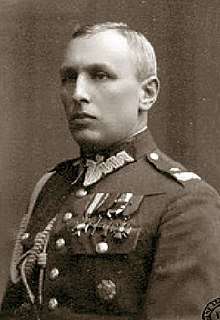Franciszek Sikorski
Franciszek Jozef Sikorski (October 4, 1889 Lwow - spring 1940 Kharkov) was a Polish engineer, General brygady of the Polish Army and a victim of the Katyn massacre.

Life
Sikorski was born in Lemberg, Austrian Galicia, and graduated from the local technical college. Before World War I, he was an active member of several Polish paramilitary organizations, including Union of Active Struggle and Riflemen's Association. In 1912, he completed a military course for officers, and joined Polish Legions in World War I, as battalion commandant in the 3rd and later 4th Infantry Regiment. In January 1915, Sikorski was promoted to captain. After the Oath crisis of 1917, he was arrested, and forced to join the Austro-Hungarian Army. In January 1918, he became the commandant of Lwow District of Polish Military Organisation.
In November 1918, Sikorski joined the newly created Polish Army, serving as commandant of the 13th Rifle Regiment of the 4th Division of Polish Rifles (General Lucjan Zeligowski). As commandant of the 20th Infantry Brigade, he fought in the Polish-Soviet War, including the Battle of Warsaw (1920) and in Eastern Galicia.
In December 1920, Sikorski entered Wyzsza Szkola Wojenna, studying there until April 1921. After completion of his course, he was named commandant of the 10th Infantry Division. Transferred in early 1923 to the 6th Infantry Division, he remained there until July 1926. During the 1926 May Coup (Poland), he supported Jozef Pilsudski.
From July 1926 until March 1932, Sikorski commanded the 9th Infantry Division. On March 16, 1927, he was promoted to the rank of General brygady. On June 30, 1933, Sikorski retired from active service, settling in Warsaw. On September 5, 1939, he was evacuated to Brzesc nad Bugiem, and then to Lwow, where he took over the command of the city (September 12), fighting in the Battle of Lwow (1939). After capitulation he was imprisoned by the Soviets in a camp at Starobilsk.
General Franciszek Sikorski was murdered by the NKVD in the spring of 1940 in Kharkiv, aged 50. On October 5, 2007, President Lech Kaczynski posthumously promoted him to Divisional general.
Family
His daughter was Ada Fighiera Sikorska, a leading Esperantist.
Awards
- Silver Cross of the Virtuti Militari
- Cross of Independence
- Gold Cross of Merit
- Cross of Valour (Poland)
- Cross of the 1939 Campaign (posthumously, awarded in London on August 15, 1985).
Sources
- Piotr Stawecki, Słownik biograficzny generałów Wojska Polskiego 1918-1939, Wydawnictwo Bellona, Warszawa 1994
- Tadeusz Kryska-Karski, Stanisław Żurakowski, Generałowie Polski Niepodległej, Editions Spotkania, Warszawa 1991